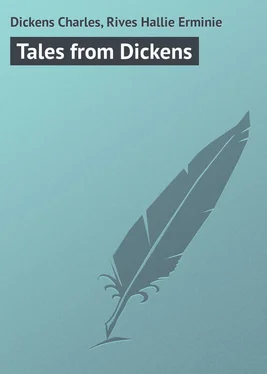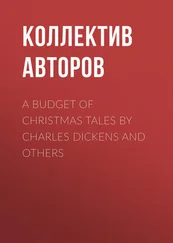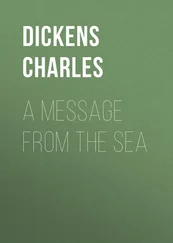Charles Dickens - Tales from Dickens
Здесь есть возможность читать онлайн «Charles Dickens - Tales from Dickens» — ознакомительный отрывок электронной книги совершенно бесплатно, а после прочтения отрывка купить полную версию. В некоторых случаях можно слушать аудио, скачать через торрент в формате fb2 и присутствует краткое содержание. Жанр: foreign_prose, на английском языке. Описание произведения, (предисловие) а так же отзывы посетителей доступны на портале библиотеки ЛибКат.
- Название:Tales from Dickens
- Автор:
- Жанр:
- Год:неизвестен
- ISBN:нет данных
- Рейтинг книги:3 / 5. Голосов: 1
-
Избранное:Добавить в избранное
- Отзывы:
-
Ваша оценка:
- 60
- 1
- 2
- 3
- 4
- 5
Tales from Dickens: краткое содержание, описание и аннотация
Предлагаем к чтению аннотацию, описание, краткое содержание или предисловие (зависит от того, что написал сам автор книги «Tales from Dickens»). Если вы не нашли необходимую информацию о книге — напишите в комментариях, мы постараемся отыскать её.
Tales from Dickens — читать онлайн ознакомительный отрывок
Ниже представлен текст книги, разбитый по страницам. Система сохранения места последней прочитанной страницы, позволяет с удобством читать онлайн бесплатно книгу «Tales from Dickens», без необходимости каждый раз заново искать на чём Вы остановились. Поставьте закладку, и сможете в любой момент перейти на страницу, на которой закончили чтение.
Интервал:
Закладка:
Dickens Charles, Rives Hallie Erminie
Tales from Dickens
Charles John Huffham Dickens, the master story-teller, was born in Landport, England, February 7, 1812. His father was a clerk in one of the offices of the Navy, and he was one of eight children.
When he was four years old, his father moved to the town of Chatham, near the old city of Rochester. Round about are chalk hills, green lanes, forests and marshes, and amid such scenes the little Charles's genius first began to show itself.
He did not like the rougher sports of his school-fellows and preferred to amuse himself in his own way, or to wander about with his older sister, Fanny, whom he especially loved. They loved to watch the stars together, and there was one particular star which they used to pretend was their own. People called him a "very queer small boy" because he was always thinking or reading instead of playing. The children of the neighborhood would gather around him to listen while he told them stories or sang comic songs to them, and when he was only eight years old he taught them to act in plays which he invented. He was fond of reading books of travel, and most of all he loved The Arabian Nights and Robinson Crusoe .
He had a great affection for Chatham and Rochester, and after he began to write stories that were printed, he often used to put these places into them. It was at Chatham that poor little David in the story, David Copperfield , lay down to sleep when he was running away from London to find his aunt, Miss Betsy Trotwood. It was to Rochester that Mr. Pickwick in Pickwick Papers , rode with Jingle. Rochester was really the "Cloisterham" where the wicked choir master, John Jasper, killed his nephew, in The Mystery of Edwin Drood . And it was in those very marshes near by, that Magwitch, the escaped convict in Great Expectations , so frightened little Pip. It is easy to see that the young Charles Dickens noted carefully and remembered everything he saw, and this habit was of great use to him all his life.
These happy years were not to last long. When he was nine years old, his father became poor and the family was obliged to move to London, where it lived in a shabby house in a poor suburb. Before another year had passed, his father was put into prison for debt – the same prison in which Little Dorrit, in the story of that name, grew up. A very bitter period followed for the solitary ten-year-old boy – a time in which, he long afterward wrote, "but for the mercy of God, he might easily have become, for any care that was taken of him, a little robber or a little vagabond." The earlier history of David in David Copperfield is really and truly a history of the real Charles Dickens in London. He was left to the city streets, or to earn a hard and scanty living in a dirty warehouse, by pasting labels on pots of blacking. All of this wretched experience he has written in David Copperfield , and the sad scenes of the debtors' prison he has put into Pickwick Papers and into Little Dorrit . Even Mrs. Pipchin, of whom he told in Dombey and Son , and Mr. Micawber in David Copperfield , were real people whom he knew in these years of poverty and despair. Dickens's life at this time was so miserable that always afterward he dreaded to speak of it, and never could bear even to walk in the street where the blacking warehouse of his boyhood had stood.
Better days, however, came at last. He was able to begin school again, and though the head-master was ignorant and brutal (just such a one as Mr. Creakle in David Copperfield ) yet Dickens profited by such teaching as he received.
After two or three years of school, he found employment as clerk in a lawyer's office. This did not content him and he made up his mind to learn to write shorthand so as to become a reporter, in the Houses of Parliament, for a newspaper. This was by no means an easy task. But Dickens had great strength of will and a determination to do well whatever he did at all, and he succeeded, just as David Copperfield did in the story.
And like the latter, too, about this time Dickens fell in love. He did not marry on this occasion, as did David, but how much he was in love one may see by the story of David's Dora.
The theater had always a great attraction for Dickens. Throughout his life he loved to act in plays got up and often written, too, by himself and his friends. Some of his early experiences of this kind he has told in the adventures of Nicholas Nickleby at Mr. Crummles's theater. But his acting was for his own amusement, and it is doubtful if he ever thought seriously of adopting the stage as a profession. If he did, his success as a reporter soon determined him otherwise.
When he was twenty-one he saw his first printed sketch in a monthly magazine. He had dropped it into a letter-box with mingled hope and fear, and read it now through tears of joy and pride. He followed this with others as successful, signed "Boz" – the child nickname of one of his younger brothers. This was his beginning. He was soon on the road to a comfortable fortune, and when at length Pickwick Papers appeared, Dickens's fame was assured. This was his first long story. It became, almost at once, the most popular book of its day, perhaps, indeed, the most popular book ever published in England. Soon after the appearance of its first chapters, Dickens married Miss Catherine Hogarth, daughter of the editor of one of the London newspapers, who had helped him in his career.
Many have tried to explain the marvelous popularity of Pickwick Papers . Certainly its honest fun, its merriment, its quaintness, good humor and charity appealed to every reader. More than all, it made people acquainted with a new company of characters, none of whom had ever existed, or could ever exist, and yet whose manners and appearance were pictured so really that they seemed to be actual persons whom one might meet and laugh with anywhere.
With such a success, and the money it brought him, Dickens had leisure to begin the wonderful series of stories which endeared him to the whole English-speaking world, and made him the most famous author of his day. Oliver Twist came first, and it was followed by Nicholas Nickleby and The Old Curiosity Shop .
In the first two of these stories one may see most clearly the principle that underlay almost all of Dickens's work. He was never content merely to tell an interesting story. He wrote with a purpose. In Oliver Twist that purpose was, first, to better the poorhouse system, and second, to show that even in the lowest and wickedest paths of life (the life wherein lived Fagin with his pupils in crime and Bill Sikes the brutal burglar) there could yet be found, as in the case of poor Nancy, real kindness and sacrifice. In Nicholas Nickleby the purpose was to show what terrible wrongs were done to children in country schools, numbers of which at that time were managed by men almost as cruel and inhuman as was Squeers in the story. It is good to learn that, as a result of this novel, an end was made of many such boys' schools. True artist as he was, Dickens seldom wrote without having in his mind the thought of showing some defect in the law, or some wrong condition of affairs which might be righted. No one could read Pickwick Papers or Little Dorrit without realizing how much wrong and misery was caused by the law which made it possible to throw a man into prison for debt. Nor can one read Bleak House without seeing that the legal system which robbed quaint Miss Flite of her mind and kept poor Richard Carstone from his fortune till the fortune itself had disappeared, was a very wrong legal system indeed. Often, too, Dickens's stories are, in a sense, sermons against very human sins. In The Old Curiosity Shop it is the sin of gambling which brings about the death of Little Nell. In Great Expectations it is the sin of pride which Pip has to fight. In Martin Chuzzlewit the evil and folly of selfishness is what Dickens had in mind.
Читать дальшеИнтервал:
Закладка:
Похожие книги на «Tales from Dickens»
Представляем Вашему вниманию похожие книги на «Tales from Dickens» списком для выбора. Мы отобрали схожую по названию и смыслу литературу в надежде предоставить читателям больше вариантов отыскать новые, интересные, ещё непрочитанные произведения.
Обсуждение, отзывы о книге «Tales from Dickens» и просто собственные мнения читателей. Оставьте ваши комментарии, напишите, что Вы думаете о произведении, его смысле или главных героях. Укажите что конкретно понравилось, а что нет, и почему Вы так считаете.












